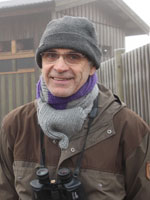|
Please sign up as soon as possible but no later than September 15 - the number of participants is limited (70)!
Further down you will find information about the speaker and practical information such as duration and accomodation.
|
|
|
| 1. |
Compare fatigue properties of two similar products. |
| |
◦ The concept of confidence intervals.
|
| 2. |
Optimal complexity in fatigue modelling, when is the Wöhler curve optimal? |
| |
◦ The concept of prediction intervals and log-linear models.
◦ An engineering interpretation of randomness.
|
| 3. |
The Wöhler curve and extensions: |
| |
◦ The concept of a dimensioning curve, Eurocode and weld standards.
◦ Variable amplitude by Palmgren-Miner.
◦ Fatigue limit considerations.
◦ Mean value influence.
◦ Initial flaw size influence and crack growth.
◦ Including former knowledge of the slope and/or the scatter.
|
| 4. |
Modelling low cycle fatigue: |
| |
◦ Estimating by two independent log-linear curves.
◦ Confidence and prediction intervals.
◦ Varying scatter variance.
◦ Including mean value influence.
|
5.
|
Durability assessments, the VMEA method:
◦ Quantify scatter and statistical errors.
◦ Quantify possible model errors.
◦ Find the total uncertainty by weighing.
◦ Add extreme risk considerations. |
|
|
|
I work as a consultant in engineering statistics at Ingenjörsstatistik.

I studied automatization in my master studies 1986-1990, with specialization in technical mathematics. In my master thesis, performed at SP Technical Research Institute of Sweden (as from 2017 incorporated in RISE Research Institutes of Sweden) in Borås. I developed a new method for generating synthetic fatigue load processes for testing and after that my work has been dedicated to statistical application in fatigue. This work has been done in close cooperation with primarily prof. Jacques de Maré, PhD Pär Johannesson and prof. Igor Rychlik.
After graduation I worked at SP Mechanics as a testing engineer and in parallel I worked for a PhD at Mathematical Statistics at Chalmers. The research work was focused on statistical modelling of spectrum fatigue and included experimental work. My PhD thesis was defended 1996 and I then continued my work as a research engineer at SP and at the Fraunhofer-Chalmers Research Center for Industrial Mathematics. Much of the work has been carried out in projects with the industry from different product areas.
I was the chairman for the Swedish fatigue network UTMIS 2009-2014.
I have served as a referee of scientific papers for the journals Extremes, Fatigue & Fracture of Engineering Materials & Structures, International Journal of Fatigue, Probabilistic Engineering Mechanics and Naval Research Logistics and from 2007-2016 I was a member of the editorial board of the journal Fatigue and Fracture of Engineering Materials and Structures.
I have also co-authored 17 publications in peer-reviewed journals, mostly about spectrum fatigue, but lately also about reliability and durability methods in fatigue.
|
|
Please sign up at the latest September 15 2017 - sign up as soon as possible since there is a limit of 70 participants.
The registration at Karlstad University is open 08:00-08:30 October 3. The course ends at 17:00 October 4.
Location
Adress: Universitetsgatan 2, Karlstad
Room: Eva Eriksson – 21A 342, Hus 21: Vänern
Duration
October 3 Day 1
08:00-08:30Registration
08:30-17:00 Seminar
October 4 Day 2
08:30-17:00 Seminar
Day 1 and 2
10:00-10:30 + 14:30-15:00 Coffee break
12:00-13:00 Lunch
Course Fee
There is no course fee for UTMIS members. For non UTMIS members, the course fee is SEK 5 000. It includes participation in the workshop, course material and refreshments at morning and afternoon coffee breaks, two lunches, and dinner in the evening October 3.
Questions could be sent to the chairman of UTMIS:
Jörgen Larsson, RISE Research Institutes of Sweden
Phone: +46 (0)10 516 56 94
|
|
There are 30 rooms reserved at the Elite Stadshotellet in Karlstad until 31 August. Book your room here or email info.karlstad@elite.se or call 054 293000 and enter code GKAU031017
Other Hotel proposals in Karlstad:
Scandic City
Scandic Winn
First Hotell River C
Clarion Hotell Plaza
|
|
|
|
Previous UTMIS Autumn Courses:
2001: Prof. K J Miller, UK, Fracture mechanics and crack propagation
2002: Prof. R Pippan, Austria, Material science for fatigue and fatigue life prediction
2003: Prof. G. Cailletaud, France, Stress calculation for fatigue
2004: Prof. Y Murakami, Japan, Metal fatigue – fundamentals and applications
2005: Prof. M W Brown, UK, Multiaxial Fatigue
2006: Prof. Tim Davis, UK, and Prof Bo Bergman, Chalmers, Failure mode avoidance
2007: Prof. Darrell Socie, USA, Fatigue made easy
2008: Prof. Grzegorz Glinka, USA, Fatigue Design of Welded Structures
2009: Prof. Michael Vormwald, Germany, A short crack growth approach to fatigue assessment
2010: Prof. Dr. Cetin Morris Sonsino, Germany, New Local Concepts for the Design of Welded Joints-Industrial Applications
2011: Prof. David Nowell, UK, Contact Fatigue – Initiation and growth of short cracks in complex stress fields
2012: André Bignonnet, France, Fatigue Load Analysis course
2013: Prof. Jim Newman, USA, Fatigue and Fracture Workshop
2014: Prof. Gunnar Härkegård, Norway, Fatigue analysis of notches, defects and cracks
2015: Prof. Ulrich Krupp, Germany, Very high cycle fatigue and the fatigue limit: significance of microstructurally short fatigue cracks
2016: Prof. Ali Fatemi, USA, Fatigue of materials and applications to design
| |
 |
UTMIS is a non-profit-making network of companies, research institutes and university departments working in the field of fatigue of materials, which aims to support their work by:
• providing and publishing information, and spreading awareness of fatigue effects
• closer cooperation between parties
• improving levels of knowledge
• performing projects to support work in the field
• raising the profile of the area with research funding organisations.
UTMIS was established 2000 and is operated as a non-profit-making association, financed by its members fees. Currently we are about fourty members among companies, research institutes and university departments.
UTMIS provides a contact point for research councils and funding organizations. One objective of this is that, by presenting information on its members' jointly formulated requirements, the result should be greater investment in fatigue-related working areas, primarily on the national level.
UTMIS also works to encourage greater international cooperation in the field of materials fatigue. In this, it is assisted by the fact that its Board is Sweden's national member of ESIS (European Structural Integrity Society).
The chairman of UTMIS is Jörgen Larsson, RISE – Research Institutes of Sweden AB.
The RISE institutes Innventia, SP, and Swedish ICT have merged in order to become a stronger research and innovation partner. Through our international collaboration programmes with academia, industry, and the public sector, we ensure the competitiveness of the Swedish business community on an international level and contribute to a sustainable society. Our 2,200 employees support and promote all manner of innovative processes, and our roughly 100 testbeds and demonstration facilities are instrumental in developing the future-proofing of products, technologies, and services. RISE Research Institutes of Sweden is fully owned by the Swedish state. www.ri.se
|
|
|
|